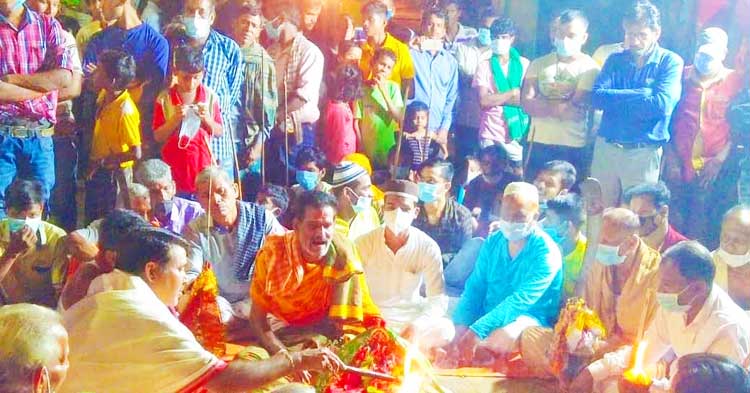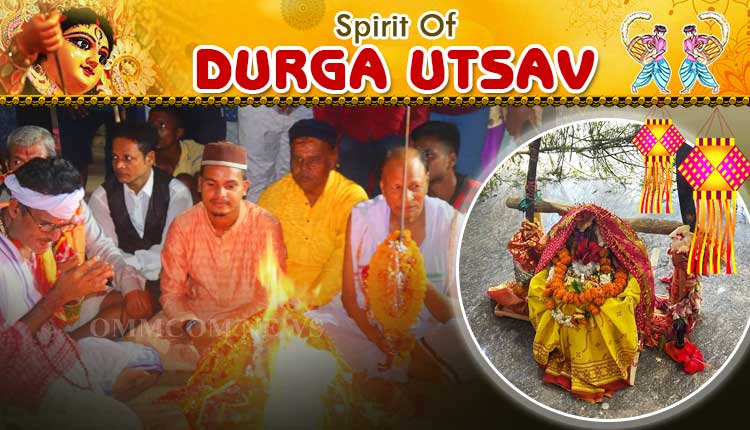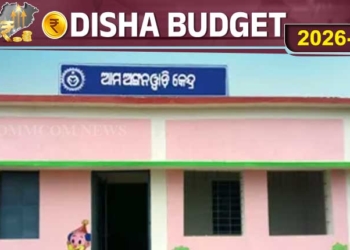In a world where religious divisions often dominate headlines, Manikagada village’s Durga Puja celebrations has turned out to be the epitome of communal harmony.
Yes, Manikgada village in Khurda district bordering Nayagarh is an example of communal harmony where Muslims and Hindus have kept alive the centuries-old tradition of celebrating the Durga puja together.
The non-descript village witnesses participation of thousands of people from both Hindu and Muslim communities in celebrating Durga Puja which continues for four days.
For over 300 years, the community of Manikagada village has exemplified exceptional communal bonhomie during the four-day autumn festival. Here Muslims don’t participate in the puja but they perform significant roles in key rituals.

As Odisha immerses itself in the vibrant festivities of Durga Puja, Ommcom News delves into the rich history and cultural essence of this revered celebration.
Meet this Muslim family of Sheikh Ajijur Rehman, who bears all expenses of the puja. Rehman, honoured as a Dalabehera (team leader), performs a crucial havan ritual on Dasami, the tenth day of Navratri.
Following the death Ajijur’s father Sheikh Mojibur Raheman and his grandfather Sheikh Habibur Rehman, Ajijur has been playing the role of ‘karta’ of a havan performed on Dasami.
In fact, Ajijur’s family bears all the expenses of the Puja and the head of the family Ajijur, plays the role of ‘karta’ of a havan performed on Dasami as part of puja ritual.
Ajijur who has been accorded the status of a Dalabehera(team leader), wears the ring made from ‘doob’ grass by a Hindu priest. On his left sits a member of the Kayastha family with a palm leaf manuscript and on his right sits a Hindu holding a sword given by the then Ranpur King to the Dalabehera. The participation of the Dalbeheras in the ‘havan’ or Aparajita puja dates back to the 18th Century when the king of Ranpur handed over his kingdom to a Muslim.
How It All Started
Legend has it that around 300 hundred years back Birabar Dev the younger brother of Puri Gajapati had taken shelter near Ranpur king after his elder brother wanted to kill him. It is said that the king was not in good terms with his elder brother for which Birabar used to sell garlands outside the Puri Jagannath temple to eke out a living. He once gifted two garlands to the queen. After the Gajapati came to know about it, he thought his brother was hatching some conspiracy against him with the help of queen. That’s why he ordered ‘Ghatak’ (an executioner) to kill his younger brother in a forest.
But the former, on the other hand, advised Birabar to leave Puri as soon as possible. It was when Birabar came to Ranpur dynasty and took shelter there. The Ranpur king asked Birabar to look after Manibandha, one part of his kingdom. Birbar later included Bolgarh, Khanguria and Bankoi to his kingdom. He assigned Sheikh Manuar a man from Muslim community as his lieutenant. Once he left for hunting to Kushapalla forest. He, however, failed to hunt any animal. On returning to his palace, he felt thirsty when he came to see a beautiful woman named Manika was on her way home with a pitcher filled with water. The girl from Adivasi Kandha community quenched the thirst of king who decided to marry her and proposed her on the spot. She, however, took him to her home where the bride’s father Sukla Jani solemnized their marriage.
Manika and her parents started residing with the king. Following their marriage, Birbar became a great devotee of Goddess ‘Bhuyan’, the deity of Adivasi Kandhas. He decided to construct a temple for the deity. But the wall of the temple could never be erected. It collapsed each time it was built. The deity told the Manika in her dream to make a human sacrifice to erect wall. Manika sacrificed her life. Since then the Goddess was known as ‘Manika Bhuyan’. Subsequently a fort was built there and it was named after Manika and was known as Manika Gada. Later, the name has been corrupted into ‘Manikagada’. One day, Dasapalla king went to the Puri temple with his siblings. During his stay in Puri, he paid a courtesy visit to Puri Gajapati who welcomed them whole-heartedly. Seeing Gajapati little upset, Dasapala King wanted to know the reason behind it.
On his asking, Puri Gajapati lamented over his past deed. He told everything to the Dasapala king how he plotted conspiracy to kill his younger brother. But now he is repenting for his past deed. Puri Gajapati overwhelmed after knowing wellbeing about his brother from Dasapala king. An elated Puri King paid a visit to Manikagada where his younger brother was leading a lonely life following his wife’s death. Puri Gajapati took his brother to Puri so that the latter could get rid of the queen’s memories. While leaving Manikagada, Birabar handed over his kingdom to his lieutenant Sheikh Manuar and started residing at Puri.
The king however advised the lieutenant to perform Dussehra every year with pomp and gaiety. Since then, his lieutenant Sheikh Manuar and his next generations have been organizing Dussehra for over 300 years. As per the records, the first Dalabehera had come from Hyderabad. After him the genealogy runs through Sheikh Anwar, Sheikh Golam Alli, Sheikh Agazan, Sheikh Basiruddin to the present descendant Sheikh Ajijur Rehman who is now the Dalabehera of Manikagada.
Why The Puja Is Unique Here
In Manikagada, the Muslim Dalabehera occupies the prime place during Dussehra. Going by the tradition, the festival continues for four days beginning from Saptami. It is customary here to observe the ‘Sohala Puja’ before Dussehra. This puja takes place in the Bhagabati Peeth situated to the east of the village. Kanak Durga worshipped in the Dibyasinghpur is brought here as the Goddess for the Puja. On the Saptami Day, the ‘Chhatri’ of Manika Bhuyan worshipped by the Kandhas, the Katari of Mahisasuri worshipped by the Dumal Gaudas, the palm leaf and lekhani of Karan Panjikar and the sword given by the Gajapati to the Muslim Dalabehera are placed together as ‘Saja’.
The Khandayat paikas also cleanse their traditional weapons and place them in Akhadaghar for the puja. All this lie there till Dashami. On Bijaya-dasami day, different techniques of the many martial arts with the swords, sticks and knives are performed by the paikas. In the evening all assemble in Manika Bhuyan’s place. The Jani (leader of Kandha community) pray to the Goddess for the welfare of the entire mankind. The Jani is then ‘possessed’ by Goddess Manika Bhuyan and sacrifice is made to appease the Goddess.
Thereafter Hindus and Muslims move with the ‘possessed’ Jani in a procession in the village accompanied by beating the drums and paikas. The Muslim Dalabehera dressed up in traditional Hindu costumes welcomes the Goddess and performs certain rituals at his doorsteps before offering prasad to the deity. The Dalabehera performs the role of a karta in the havan which is known as Aparajita puja to mark end of the carnival.
What They Say
Sheikh Ajijur Rehman who plays a pivotal role in the puja rituals, says, “I have been doing the puja after my father’s death. The Durga Puja at Manikagoda village is unique here as a Muslim family organises it. I have been performing the role of a ‘karta’ in the havan for last three years. Besides, prasad offered to the Goddess is prepared by my family. It is later served to the Hindus and other devotees. My grandfather and father have been organizing Durga Puja for so many years. I stepped into it three years back. This is nothing but the blessing of Goddess for which my family still is successfully organizing the puja.”
He, however, regrets that though we bear all the expenses of the puja, no one comes forward to extend a helping hand. We have written to the district administration and other concerned departments to grant fund so that we can keep this tradition alive, but none paid heed to our concerns. Being a farmer family, it is really difficult on our part to organise the festival with pomp and gaiety. Some years back, my father had to sell out gold ornaments to organise the puja.”
Ajijur’s uncle Nisar Ali Khan said, “Ajijur’s family has kept people of different faiths united through this fair. In our village, we give importance to all the festivals whether it is Dussehra or Eid. We take part in their festival and vice versa. Though sometimes it comes to our mind not to organise the event due to fund crunch, but we could not able to stop ourselves from organising the puja because of the Goddess’s blessing.
Rashmi Rekha Das
















